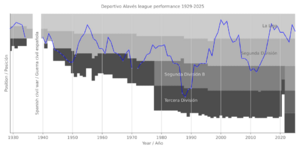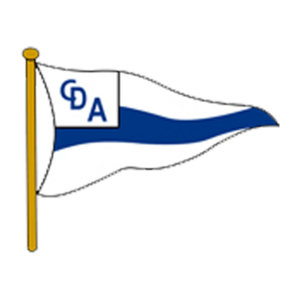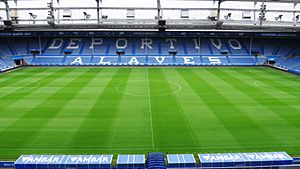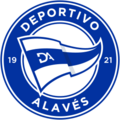Deportivo Alavés facts for kids
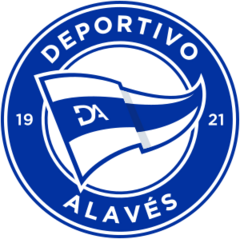 |
|||
| Full name | Deportivo Alavés, S.A.D. | ||
|---|---|---|---|
| Nickname(s) | Babazorros El Glorioso (The glorious one) Los blanquiazules (The Blue and Whites) |
||
| Founded | 23 January 1921 as Sport Friend's Club | ||
| Ground | Campo de fútbol de Mendizorroza | ||
| Capacity | 19,840 | ||
| Owner | Baskonia-Alavés Group | ||
| President | Alfonso Fernández de Trocóniz | ||
| Head coach | Eduardo Coudet | ||
| League | La Liga | ||
| 2022–23 | Segunda División, 4th of 22 (promoted via play-offs) | ||
|
|
|||
Deportivo Alavés is a Spanish football club. It is often called just Alavés. The team is based in Vitoria-Gasteiz, a city in the Basque Country region of Spain.
The club started on January 23, 1921, as Sport Friend's Club. Today, Alavés plays in La Liga, which is the top football league in Spain.
Alavés is known as one of the most successful teams in the Basque Country. Only Athletic Club and Real Sociedad have achieved more. A big moment for the club was in 2001. They reached the final of the UEFA Cup, a major European competition. They played against Liverpool in a very exciting match. Alavés lost 5–4 in extra time. In 2017, the team also made it to the final of the Copa del Rey, Spain's main cup competition. They lost 3–1 to Barcelona.
The team's home uniform is a blue and white striped shirt. They wear blue shorts and white socks. Alavés plays its home games at the Mendizorrotza Stadium. This stadium can hold 19,840 fans. The team also trains at facilities in Ibaia.
Contents
Club History and Achievements
Deportivo Alavés was first founded in 1920 as Sport Friends. On January 23, 1921, the name changed to Deportivo Alavés. This date is considered the official start of the club. Alavés was the first team to move up from the Segunda División to La Liga in the 1929–30 season. They stayed in La Liga for three years. In their first top-league season, they finished 8th out of 10 teams. They just avoided being sent down to a lower league.
In the 1953–54 season, Alavés returned to the top league for two years. Later, in June 1983, the team went down to Segunda División B. This was a lower division. The club faced tough times in the 1990s. They even played in the fourth tier for a while. But Alavés fought back. They earned promotion to the Segunda División in 1994–95. This happened after winning their group in Segunda División B for two years in a row.
After winning the Segunda División in 1997–98, Alavés came back to La Liga. This was after 42 years away. In their first season back, they barely avoided relegation. The next year, they beat Barcelona twice. They finished sixth in the league. This was their highest-ever finish. It also meant they qualified for the UEFA Cup for the first time.
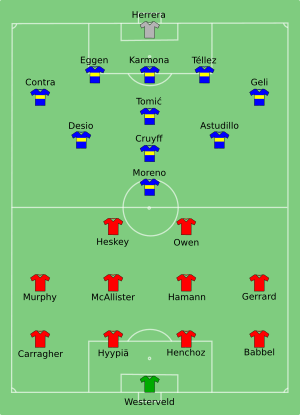
In the 2000–01 season, Alavés had an amazing run in the UEFA Cup. They beat big teams like Internazionale and 1. FC Kaiserslautern. They won against Kaiserslautern with a huge 9–2 total score. The final match was against Liverpool. It was an incredible game that ended 5–4 to Liverpool in extra time. Many people remember it as one of the best finals ever.
Alavés finished seventh in La Liga in 2001–02. This allowed them to play in the UEFA Cup again. However, their European journey in 2002–03 was shorter. They won one match but then lost to Beşiktaş. On January 26, 2003, the club celebrated its 100th win in La Liga. They beat Real Valladolid 3–1.
Alavés was relegated from La Liga in 2002–03. They returned to the top league two years later. During this time, a businessman named Dmitry Pietrman bought the club. His time as owner was difficult. The club faced many problems and went into debt. Alavés was relegated again after the 2005–06 season. Pietrman left in 2007.
The club then spent four years in the third division. In 2013, José Antonio Querejeta bought Alavés. The team was promoted back to the second division. This helped them fix their money problems. Three years later, on May 29, 2016, Alavés won the second division. They were promoted to La Liga once more.
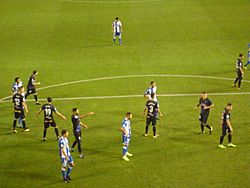
On September 10, 2016, Alavés achieved a big win. They beat the defending La Liga champions, Barcelona, 2–1 at their home stadium. On February 7, 2017, Alavés made history. They reached the 2017 Copa del Rey Final for the first time ever. They had never been to the final of this national cup before. Their opponent was Barcelona, who won the final 3–1. Alavés finished 9th in La Liga that season.
In the 2021–22 season, Alavés was relegated from La Liga. This ended their longest stay in the top league, which was six years. But the very next season, they fought hard and earned promotion back to La Liga. They won a play-off final against Levante. This meant they returned to the top tier for the 2023–24 season.
Club Seasons Summary
Deportivo Alavés has played in Spain's top football leagues for many years:
- 20 seasons in La Liga (the top league)
- 38 seasons in Segunda División (the second league)
- 12 seasons in Segunda División B (the third league)
- 22 seasons in Tercera División (the fourth league)
- 1 season in Regional Categories (a lower regional league)
European Competitions
Alavés has played in the UEFA Cup (now called the UEFA Europa League) twice.
- 2000–01 UEFA Cup:
* First Round: Won against Gaziantepspor (Turkey) * Second Round: Won against Lillestrøm SK (Norway) * Third Round: Won against Rosenborg (Norway) * Round of 16: Won against Internazionale (Italy) * Quarter-finals: Won against Rayo Vallecano (Spain) * Semi-final: Won against Kaiserslautern (Germany) * Final: Lost 5–4 to Liverpool (England)
- 2002–03 UEFA Cup:
* First Round: Won against Ankaragücü (Turkey) * Second Round: Lost to Beşiktaş (Turkey)
Team Players
Current Squad
|
|
Players on Loan to Other Teams
|
|
Team Uniforms
For many seasons, Alavés wore uniforms made by the Danish brand Hummel. In the 2017-2018 season, they switched to new kits from Kelme. This agreement lasted until 2022. In 2022, the team signed a new deal with the German company Puma for four seasons.
When Puma launched the new uniforms, they brought back the traditional vertical stripes. They also kept the original black shorts.
Club Symbols and Crest
Deportivo Alavés has changed its club crest several times since 1921. The very first crest looked a lot like the official symbol of the Álava province. Instead of an arm holding a sword, the team's crest showed a blue and white flag. At the top, there was a small circle with the letters "DA" for Deportivo Alavés.
In 1922, the crest became simpler. It was just a white flag with a blue stripe in the middle. The letters "DA" were in a square in the top left corner. This design stayed until 1950. However, the letters changed when the team's name became Club Deportivo Alavés. In 1950, the team updated its crest again. It looked more like the traditional Álava symbol. They added back the castle and lion, and also a sword. The "C.D.A." flag was placed behind the castle. The whole design was inside a circle with a crown on top.
Club Honours and Trophies
Spanish Competitions
* Runners-up: 2016–17 (finished second)
- Segunda División (Second Division)
* Winners (4): 1929–30, 1953–54, 1997–98, 2015–16
- Segunda División Play-offs
* Winners (1): 2023
- Segunda División B (Third Division)
* Winners (4): 1992–93, 1993–94, 1994–95, 2012–13
- Copa Federación de España
* Winners: 1945–46
- Tercera División (Fourth Division)
* Winners (6): 1940–41, 1960–61, 1964–65, 1967–68, 1973–74, 1989–90
- Regional Championships
* Biscay Championship: 1929–30 * Gipuzkoa Championship: 1938–39
European Competitions
* Runners-up: 2000–01 (finished second)
Stadium Information
- Name – Mendizorrotza
- City – Vitoria-Gasteiz
- Capacity – 19,840 people
- Opened – 1924
- Pitch size – 105 meters by 67 meters
- Other training places – El Glorioso and José Luis Compañón
Famous Players
Some players have played for their country in the World Cup while being part of Alavés:
 John Aloisi (in 2006)
John Aloisi (in 2006) John Guidetti (in 2018)
John Guidetti (in 2018)
Images for kids
See also
 In Spanish: Deportivo Alavés para niños
In Spanish: Deportivo Alavés para niños
 | Emma Amos |
 | Edward Mitchell Bannister |
 | Larry D. Alexander |
 | Ernie Barnes |


